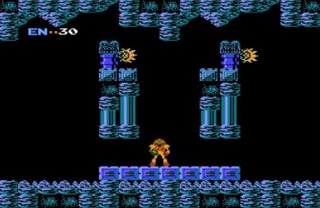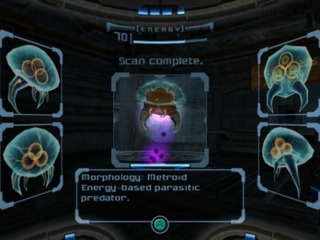Metroid and Me, Part 2: Into the Green World
By majormitch 5 Comments
Welcome to part two of “Metroid and Me,” my lengthy, introspective blog series exploring why the Metroid franchise is such a resonant one for me. If you haven’t read it, I highly suggest starting with part one (link below). Not only does it explain what this blog series is, it also covers my personal history with Metroid, which I think provides useful context for what’s to come. Because now it’s time to really dive into the “red meat” of this series, and start looking at precisely what it is about Metroid that has connected with me so strongly. Each part will have its own overarching topic, but also bear in mind that there is some overlap between them; it’s the delicate synergy between its many characteristics that makes Metroid so special after all. So while each part focuses on one topic, my goal is that by the end they will all combine to form a larger, holistic view of what the series means to me. To kick things off, we’re going to look at one of the broader and more obvious appeals of Metroid: its sense of adventure.
| Remix Title: Into the Green World | Original Song: Brinstar - Plant Overgrowth Area (Super Metroid, 1994, SNES) |
| Remixer(s): Sam Dillard | Original Composer(s): Kenji Yamamoto and Minako Hamano |
Into the Green World
You’ve just landed on an unfamiliar alien planet. You have no idea what dangerous creatures or hostile environments lie before you. You have no clue where to begin your search, no way to know which direction your mission lies. In fact, you’re not 100% sure what your mission even is, but you know without a doubt that evil is lurking beneath the surface, and that you will need all your wits and courage if you’re going to stop it. You gather yourself, open the door leading away from the safety of your ship, and descend into the great unknown.

This simple yet daunting gambit is the one presented to you at the start of a Metroid game, and sets the tone for a thrilling adventure. “Adventure” is the key word here, and I believe that a strong sense of adventure has been one of the series’ biggest strengths from the very start; the original Metroid, released in Japan 30 years ago, was built upon such a foundation. Without so much as a hint, it started you off on a bizarre alien world, and left it up to you to dive in head first and find your own way. Players immediately found out just how little the game was willing to direct them. In a subtle yet iconic move, the very opening room of Metroid allowed you to move either left or right. The design of the room very quietly suggested moving to the right, which was also the convention of the vast majority of video games at the time (and generally still is). I’d guess that most of us moved right, but it didn’t take long to realize you weren’t going to get very far that way. That meant players were already backtracking, back to the left of the starting position, where they found an important upgrade that let them progress farther to the right. In this simple, bold, and instructive introductory moment, players had already experienced a microcosm of Metroid. You set out and explore in whatever direction you choose, poke and prod until you can’t go any farther, then regroup and try a different path. As the game goes on those paths grow longer, more numerous, and interconnect in clever ways (this complexity is a big part of the franchise’s longevity and appeal). But the underlying exploration it demands is there from, literally, the start.
It takes an adventurous spirit, a certain kind of “go with the flow” attitude to get over this initial hump. And even then you have to be willing to keep throwing yourself into the wilderness as it continues to, slowly but surely, become ever more convoluted. There’s that moment in almost every Metroid game where I’ve been making good progress, gaining new abilities and opening up the world substantially, only to find myself somewhat stumped. I pull up the map and think “There’s nowhere left to go.” But there always is, and to find it I have to dive back in and fully wrap myself in this untamed world. Somewhere there is a newly accessible nook that went overlooked, or a path that can be accessed in an unexpected way. Even after playing a Metroid game multiple times it can still catch me. I frequently overlook the Wrecked Ship in Super Metroid, or just how many places you can use the Grapple Beam in Metroid Prime. Part of this is purely attention to detail; in theory, if you notice and remember every little thing on the map you’ll never get lost. More realistically, it’s the willingness to explore and re-explore as necessary. Most people, myself included, can’t memorize these large worlds in their entirety. At least not without spending dozens, if not hundreds, of hours in them. Instead, you must keep diving back in to resurvey the land and map a new route. As time goes on you become more and more intimately familiar with the world around you, but the sense of discovery is always present. There’s always something new to uncover, even in seemingly well-worn territory.

The desire to keep your explorer’s hat on for hours is the driving force behind any Metroid experience. That kind of mindset is not for everyone, as it demands a certain level of curiosity and self-motivation on the part of the player that’s rarely needed (or even encouraged) in a lot of games. The simple idea of backtracking itself is often seen as wasting time, and regularly shunned in favor of more clear, tangible progress. That’s a perfectly valid preference, and there are also plenty of games that implement backtracking poorly, or don’t have worlds worth retreading. In those cases it can be frustrating, but I also believe there’s merit to becoming so invested in a well-crafted video game world that you genuinely want to discover all the little nooks and crannies. Think about the difference between a tourist and a traveler. The tourist is there to see the highlight attractions in the most direct, efficient method possible. They follow the guidebook, go down the checklist, and see the “big stuff” without straying too far off the main path. The traveler is there to become a part of this new place, and experience all that comes with it. They want to see a place how a native would see it, to understand what makes it tick, or what it’s like to live there. They want to be a part of a new environment, rather than simply pass through it. Metroid, as much as any game, frustrates the tourist and rewards the traveler. It presents highly detailed and complex worlds, and demands the player pay attention and embrace every part of it as they search for their goal. There’s no surface level sightseeing here; you’re going to need to become just as familiar with those back alleys and local conventions as you are the famous landmarks if you want to complete your mission.
Deep down, I’ve always been more of a “traveler,” which for our purposes might as well mean “adventurer.” When I visit a different location, be it a new park, city, or foreign country, I generally don’t care that much about the “big” sights. Sure, I saw the Colosseum when I went to Rome, but I was far more interested to venture down the side streets, to walk where the locals walked and eat what they ate. I wanted to feel, in some small way, like I was a part of the city, rather than just passing through. One of my personal favorite trips was a weekend trip that I took by myself to Split, Croatia. To my knowledge Split is not known as a traditional tourist hotspot with world famous attractions, but I had a great time meandering about the city, exploring its various corners, alleys, and parks. I’m always excited to see what’s around the next corner, and I enjoy the process of mapping out and learning a new area. Along the same lines, I love to hike because I enjoy the sense of self-guided exploration, of being subjugated to the rules of a foreign space and learning to adapt on the fly. There’s something pure and thrilling about stripping yourself from the comforts of daily life, and focusing on unfamiliar challenges directly in front of you. That thrill is a defining part of the adventure, and I’ve always been a closet thrill-seeker in that respect.
Metroid has essentially “gamified” this type of adventuring, which fits my tastes perfectly. You’re encouraged, and often required, to go off and explore every corner of a foreign world. Doing so leads to more items and power-ups, which will enable you to access new areas and grow stronger. It takes fairly traditional video game mechanics, and embeds them within expansive worlds worth exploring, which is precisely what makes it all work so well. The idea of “exploration” in video games is a noble one, but it falls flat on its face if the virtual space in question isn’t exciting. That’s one of the areas where Metroid truly shines; few video games worlds are so lovingly handcrafted, detailed, and lively (as we’ll see in future parts). Simply being in these worlds feels adventurous.

I’ve focused a lot on the idea of “exploration” here, and while I consider that a substantial part of what I mean by “adventuring,” it’s certainly not the only part. The adventure of Metroid also lends itself to plenty of action and surprises, if in its own, subtle way. There are rarely blockbuster set pieces or grand plot twists here, but the happenings in a Metroid adventure are extremely resonant nonetheless. Metroid Prime’s tagline states that before evil can be destroyed, it must be found. While exploring Tallon IV, you end up fighting Space Pirates and reading about their experiments. As you inevitably fight their creations yourself, you’re slowly exposed to this “evil,” which builds up to a poignant encounter with their freshly engineered Metroid variants. That’s about as dramatic as Metroid gets, and while it may sound dull on paper, the way such moments play out feel important. Seeing and understanding the game’s events doesn’t happen in a flashy cutscene or through melodramatic exposition; these moments happen naturally as you explore and fight your way through historic ruins and fiery caverns. This adventure that forms naturally through your own actions can lead to all sorts of implicit revelations, and I’d argue that they can be even more effective as a result. I’ll continue to cover Metroid’s narrative structure and its impact next week, but it does meaningfully add to the series’ sense of high adventure in a way that I strongly appreciate.
Plenty of games have a strong sense of adventure, including more than a few of my favorites. But Metroid, by keeping the focus so heavily on the adventure itself, is as pure as any in that regard. There’s no elaborate or obtuse goals, no long-winded monologues, no side quests or distractions, no markers littering the screen, and no gimmicks. It’s just you, out there on your own, exploring an untamed world that somehow needs to be tamed. It’s about embracing the unknown, discovering as you go, and becoming familiar with a world that initially seemed anything but. That’s the adventure of Metroid, and it’s an adventure that has resonated with me very strongly time and again. Setting foot onto an alien planet has rarely been this exciting, and a lot of that has to do with the quality of such worlds. That leads us directly into next week’s topic, where I will dive head first into one of Metroid’s more defining characteristics: its thick atmosphere.

5 Comments